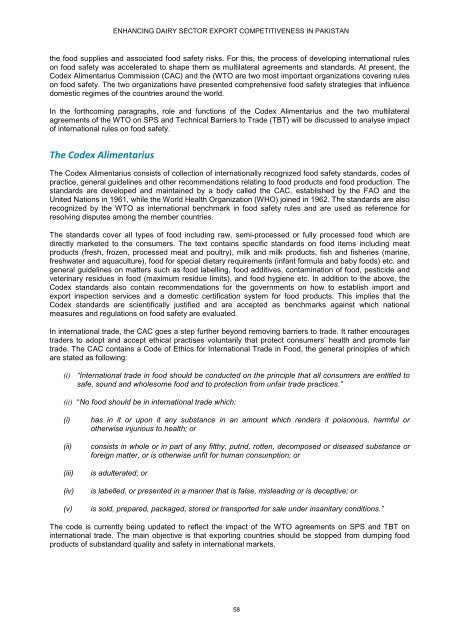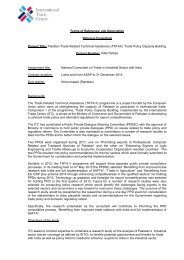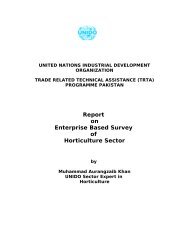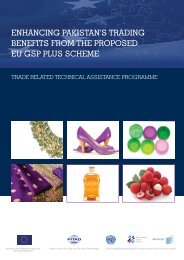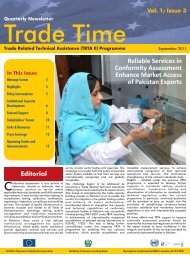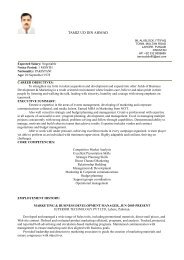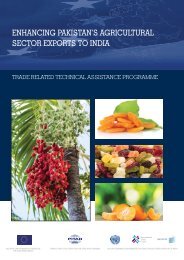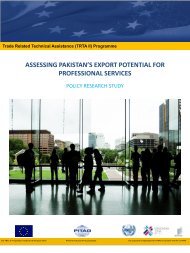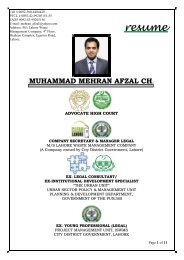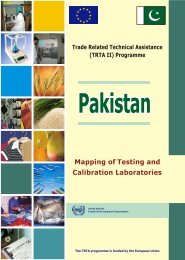ENHANCING DAIRY SECTOR EXPORT COMPETITIVENESS IN PAKISTANrelating to animals, especially <strong>dairy</strong> and meat products may only be imported unless these are certified tobe “Halal”, i.e. slaughtered in accordance with Islamic laws.The Customs and the Plant Protection and Quarantine (PPQ) Departments are the two main agenciesinvolved in the regulation of imported food products. The Customs Department’s main function is to ensurethat the shelf-life and labelling of imported food products are according to the federal government’srequirements. The basic requirement being that the imported food product should have at least 50% of theremaining original shelf life at the time of importation. This standard is met through correct labellingcontaining the production and expiration dates. Certain livestock products containing pork or pork productsare prohibited/ banned to be imported on religious basis. These along with other banned products areincluded in the “Negative List” maintained by the federal government. The PPQ’s main function is to ensurethat shipments containing live animals meet the phyto-sanitary import requirements.Import and Export Policy Orders (2009)According to Clause 5 of the Import Policy Order, 2009, the import of live animals, including sheep, goats,cattle and buffaloes, meat, bone meal and tallow containing protein and feed ingredients are prohibitedfrom Bovine Spongiform Encephalopathy (BSE) 64 infected countries such as the United Kingdom, Ireland,Belgium, Denmark, Falkland, France, Germany, Italy, Luxembourg, Holland, Spain, Brazil, CzechRepublic, Austria, Poland, Slovakia, Slovenia, United States and the Alberta Region of Canada. 65 The banis however not applicable to import of feed ingredients such as growth promoters, concentrates, milkenhancers, enzymes and fish meal replacers that have originated from vegetable, poultry, mineral and seasources from the above mentioned BSE-infected countries.On the other hand, although the Export Policy Order, 2009 allows <strong>export</strong> of live animals, the same can berestricted by the federal government as and when needed. Live animals have been included in Schedule II,which is a list of products that can be <strong>export</strong>ed from Pakistan subject to given conditions. These conditionsand the required <strong>export</strong> procedures were implemented by the Ministry of Livestock and Dairy Developmentbut after devolution, the same has been assigned to the Ministry of Commerce.Both policy orders were formulated and are enforced by the Ministry of Commerce in Pakistan.Price RegulationsDrawing authority from a federal legislation called the Price Control and Prevention of Profiteering andHoarding Act, 1977 (PCPPHA), the federal government controls prices of daily life commodities, includingmilk, through the National Price Control Committees for welfare of the general public, There are subcommitteesworking under this national level committee operating on district levels that ensure pricecontrol in their particular regions.The domestic <strong>dairy</strong> market is currently facing a dilemma in which price of milk produced in the informal<strong>sector</strong> is being regulated by local authorities in the urban markets, whereas no such regulations areapplied to prices of packaged milk and <strong>dairy</strong> products in the formal <strong>sector</strong>. In case of informal milkproduction, the designated officials of the local authorities carry out a market survey and then inconsultation with the relevant stakeholders the committees fix a selling price of fresh milk in the domesticmarket. The practice seems to be against the spirit of business competition as laid down in the CompetitionAct, 2010 and has been facing criticism from concerned stakeholders recently.The <strong>International</strong> Food Safety Regime and Domestic ComplianceWith increased globalization resulting due to significant rise in international trade in the 1990s, a majortrend has emerged in which consumers around the world have become more conscious about the origin of64 Bovine Spongiform Encephalopathy, commonly known as “Mad Cow Disease” which can most easily be transmitted to humanbeings by eating food contaminated with the brain, spinal cord or digestive tract of infected carcasses.65Import of meat and meat products from other parts of Canada shall however be allowed subject to certifying additional animalquarantine requirements57
ENHANCING DAIRY SECTOR EXPORT COMPETITIVENESS IN PAKISTANthe food supplies and associated food safety risks. For this, the process of developing international ruleson food safety was accelerated to shape them as multilateral agreements and standards. At present, theCodex Alimentarius Commission (CAC) and the (WTO are two most important organizations covering ruleson food safety. The two organizations have presented comprehensive food safety strategies that influencedomestic regimes of the countries around the world.In the forthcoming paragraphs, role and functions of the Codex Alimentarius and the two multilateralagreements of the WTO on SPS and Technical Barriers to <strong>Trade</strong> (TBT) will be discussed to analyse impactof international rules on food safety.The Codex AlimentariusThe Codex Alimentarius consists of collection of internationally recognized food safety standards, codes ofpractice, general guidelines and other recommendations relating to food products and food production. Thestandards are developed and maintained by a body called the CAC, established by the FAO and theUnited Nations in 1961, while the World Health Organization (WHO) joined in 1962. The standards are alsorecognized by the WTO as international benchmark in food safety rules and are used as reference forresolving disputes among the member countries.The standards cover all types of food including raw, semi-processed or fully processed food which aredirectly marketed to the consumers. The text contains specific standards on food items including meatproducts (fresh, frozen, processed meat and poultry), milk and milk products, fish and fisheries (marine,freshwater and aquaculture), food for special dietary requirements (infant formula and baby foods) etc. andgeneral guidelines on matters such as food labelling, food additives, contamination of food, pesticide andveterinary residues in food (maximum residue limits), and food hygiene etc. In addition to the above, theCodex standards also contain recommendations for the governments on how to establish import and<strong>export</strong> inspection services and a domestic certification system for food products. This implies that theCodex standards are scientifically justified and are accepted as benchmarks against which nationalmeasures and regulations on food safety are evaluated.In international trade, the CAC goes a step further beyond removing barriers to trade. It rather encouragestraders to adopt and accept ethical practises voluntarily that protect consumers’ health and promote fairtrade. The CAC contains a Code of Ethics for <strong>International</strong> <strong>Trade</strong> in Food, the general principles of whichare stated as following:(i) “<strong>International</strong> trade in food should be conducted on the principle that all consumers are entitled tosafe, sound and wholesome food and to protection from unfair trade practices.”(ii) “No food should be in international trade which:(i)(ii)(iii)(iv)(v)has in it or upon it any substance in an amount which renders it poisonous, harmful orotherwise injurious to health; orconsists in whole or in part of any filthy, putrid, rotten, decomposed or diseased substance orforeign matter, or is otherwise unfit for human consumption; oris adulterated; oris labelled, or presented in a manner that is false, misleading or is deceptive; oris sold, prepared, packaged, stored or transported for sale under insanitary conditions.”The code is currently being updated to reflect the impact of the WTO agreements on SPS and TBT oninternational trade. The main objective is that <strong>export</strong>ing countries should be stopped from dumping foodproducts of substandard quality and safety in international markets.58


